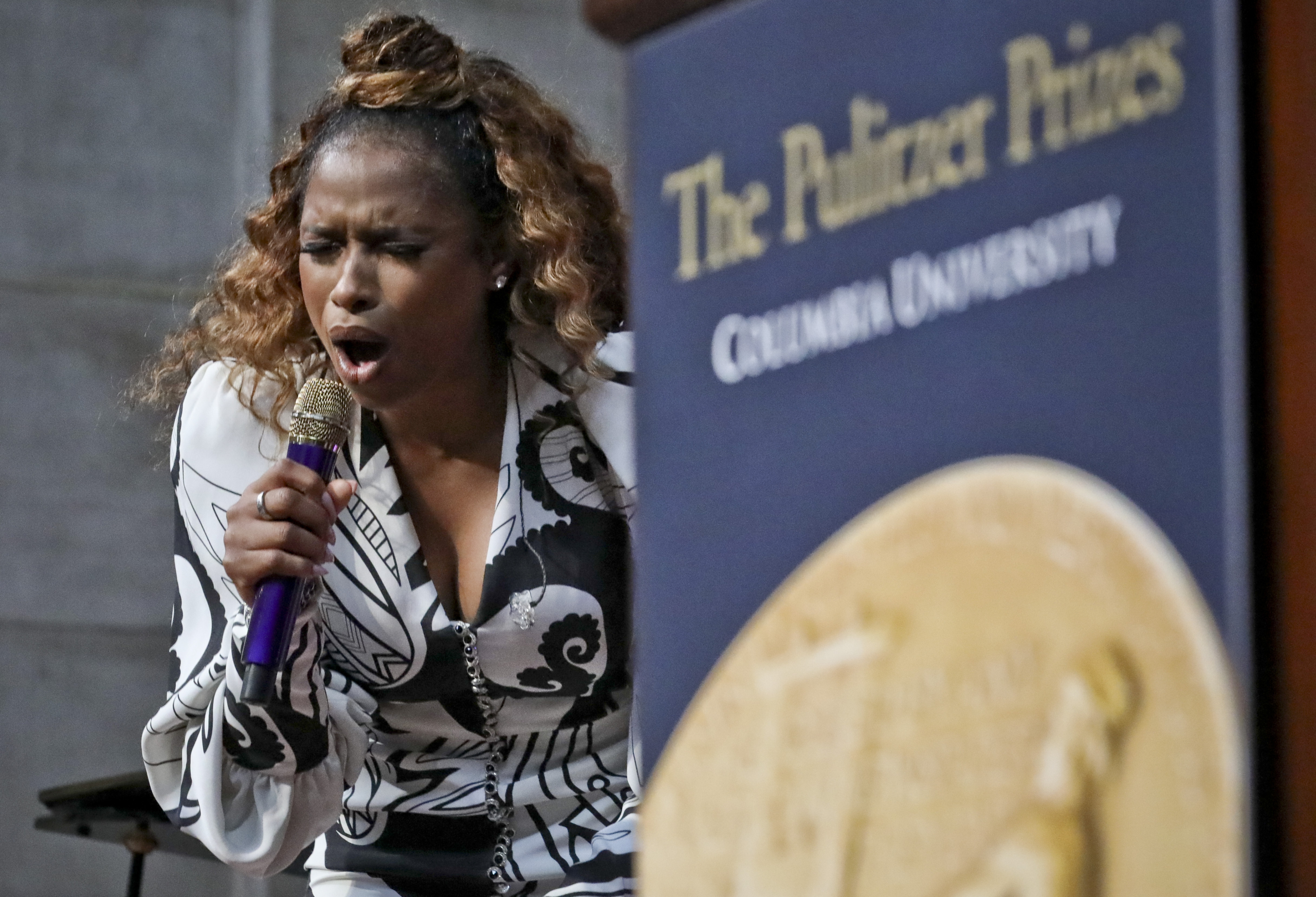The distribution of the Pulitzer Prizes, in the rotunda of Low Library at Columbia University, one of the stateliest columned rooms this side of the Atlantic, is a perennially anticlimactic affair. The winners are announced weeks ahead.
So it was rather stunning when, as servers set down plates of dessert, with chocolates pressed into the Pulitzer logo and flecked with gold leaf, Jennifer Hudson appeared from behind a curtain. She wore a long, flowing gown with a deep V-neck, white with black zig-zagging designs—notebook marginalia. Her hair, curly with blond coloring, sprang out and down her back like a hero’s cape. By way of introduction, Dana Canedy, the Pulitzer’s administrator, let everyone know that, as a tribute to Aretha Franklin—to whom the Pulitzer committee awarded a posthumous special citation for her contributions to American music and culture—Hudson had made an impressive voyage: her flight had been cancelled, and she’d driven 14 hours to make this appearance. When Hudson erupted in song, the room was airlifted: “Amazing Grace.”
ICYMI: The fabulist who changed journalism
The unofficial theme this year, not for the first time, was the spectacular triumph of the press in the face of intimidation and violence. Guests of honor included students of Marjory Stoneman Douglas High School, who survived a fatal shooting (the Pulitzer committee received a submission from The Eagle Eye, the school’s newsmagazine. “I had a favorite this year among the entries,” Canedy said. “It was a submission that did not win”); staff members of the Capital Gazette, in Annapolis, Maryland, who survived a fatal shooting (recipients of a special citation); and Wa Lone and Kyaw Soe Oo, Reuters journalists who were recently released from prison in Myanmar after 511 days behind bars (awarded for international reporting). Lee Bollinger, Columbia’s president, shook hands with the victors, one by one.
Hudson’s rendition, belting catharsis, was a worthy homage to Franklin (whom she’s been cast to play in an upcoming biopic). As she let her vibrato go, Hudson turned in the direction of the Reuters table. Wa Lone and Kyaw Soe Oo beamed. They leaned in to exchange whispers. Who could have imagined such an extraordinary thing? Afterward, Wa Lone said: “She was great.”
Wa Lone and Kyaw Soe Oo may not possess Hudson’s celebrity, though in that rotunda, they were greeted with a reception nearly equal to hers. Both men were dressed in black sweaters with crisp white shirts poking out at the collar, which made them resemble priests—happy, free priests. When it was their turn to be invited onstage, they were given an opportunity to speak—an honor not granted to any of the other award winners—and used their platform to express thanks: Kyaw Soe Oo in Burmese (through a translator: “We are incredibly grateful for all the support we have received from all the journalists and media organizations around the world”); Wa Lone in English (“I feel very humble and greatly honored to be here”).
The rest was what it was: Martin Baron, editor of The Washington Post, and Dean Baquet, editor of The New York Times, met in the middle of the room; Baron initiated a hug, which Baquet accepted. A “woo” for David Barstow, Susanne Craig, and Russ Buettner, who wrote an exposé of Donald Trump’s finances for the Times. A “woo” for Carlos Lozada, honored for his criticism in the Post. A “woo” for Forrest Gander, the winner for poetry (yay, poetry). Servers brought out risotto, beef, and a buttery portion of fish while devastating images of children starving in Yemen—by Lorenzo Tugnoli, winner for feature photography—flashed on two large screens. Tony Messenger—the winner for his commentary in the St. Louis Post-Dispatch, who brought his dad—nursed a beer, then another. Everyone clapped for The Advocate—whose owners, in Baton Rouge, Louisiana, just bought a competing paper, the Times-Picayune, and laid the latter’s staff off.
Wrapping up, champagne was passed around to the winners, who took a sip before setting their glasses down and picking their phones up: in a room of journalists, a private concert from Jennifer Hudson would inevitably, immediately be recorded, streamed, and broadcast on social media. On their way out, guests received Franklin’s complete recordings on vinyl. Wa Lone and Kyaw Soe Oo posed for a picture with the rest of their Pulitzer class before they made their way home.
ICYMI: 100 years of Pulitzer data
Betsy Morais is the managing editor of CJR.

